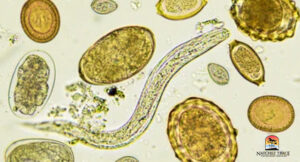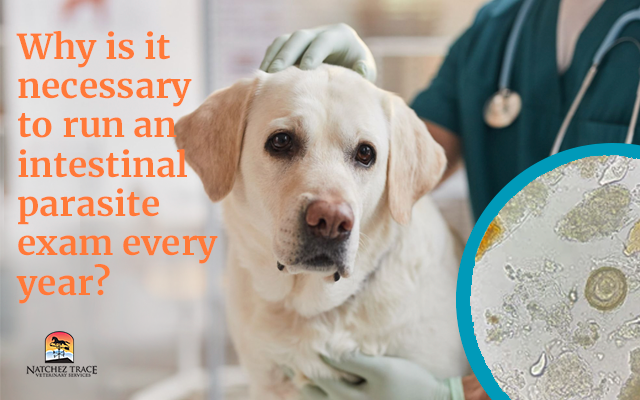According to experts in the field, parasite exposure in dogs is higher than ever, making a yearly intestinal parasite exam or fecal test for dogs crucial. It is the best way to be sure that neither your pet nor your household will get intestinal parasites.
In addition to medical exams and vaccines every year, a fecal (stool) sample from your dog should be tested to check for intestinal parasites. This is also called a fecal exam.
This test may be done in our office during your physical examination. It usually takes around 15 minutes to get results.
Roundworms, Hookworms, Whipworms, Tapeworms, Coccidia, and Giardia are some of the common parasites found. The majority of intestinal parasites, except for tapeworms, either do not pass in the feces (at least not until they are dead) or if they did, they are so minute that you would have trouble seeing them.
What Is a Fecal Test for Dogs?
 A proper annual physical should include a fresh fecal examination. It includes evaluating your pet’s feces at a microscopic level. This assists veterinarians and veterinary technicians in identifying and treating infections that could be challenging to detect otherwise.
A proper annual physical should include a fresh fecal examination. It includes evaluating your pet’s feces at a microscopic level. This assists veterinarians and veterinary technicians in identifying and treating infections that could be challenging to detect otherwise.
We can collect a sample from your pet in-clinic or we may instruct you to bring in a sample. If instructed to bring in a sample, bring a fresh specimen for your dog’s veterinarian that is 4 to 6 hours old rather than dried-out “fossil feces.” Many of the possible parasites are killed by drying out and dehydration. Their presence may be covered up.
What Can a Fecal Examination Detect?
A fecal test for dogs can identify many intestinal parasites, such as hookworms and roundworms.
 Pets with intestinal parasites are uncomfortable and irritated, and they may develop more serious health problems. Additionally, it’s important to remember that some intestinal parasites are zoonotic, spreading from dogs to people or other animal species.
Pets with intestinal parasites are uncomfortable and irritated, and they may develop more serious health problems. Additionally, it’s important to remember that some intestinal parasites are zoonotic, spreading from dogs to people or other animal species.
Invisible intestinal parasites may be found in your pet’s gastrointestinal system.
Your veterinarian can identify and treat intestinal parasites early with an annual fecal test for dogs.
Where Can My Dog Possibly Acquire These Parasites?
Most municipal city parks and public spaces have a high incidence of canine gastrointestinal parasites (both worms and protozoans such as Giardia).
 Similarly, ponds, lakes, rivers, and streams in neighborhoods that are adjacent to densely inhabited regions frequently have parasites that might harm our canine companions.
Similarly, ponds, lakes, rivers, and streams in neighborhoods that are adjacent to densely inhabited regions frequently have parasites that might harm our canine companions.
Possibilities of additional exposure include dog parks, boarding, daycare, and grooming establishments.
The exposure is higher if your robust pet engages in activities like retrieving, hiking, cross-country skiing, running, jogging, dog shows, etc.
What is the Importance of Running an Intestinal Parasite Exam Every Year?
Routine fecal test for dogs for these parasites are crucial because prolonged infections can cause vomiting, diarrhea, anemia, bad hair coats, and malnutrition.
These unpleasant organisms may also be spread from your pet to you, and especially to kids!
Every year, your adult pooch should get an intestinal parasite exam for dogs.
As certain parasites migrate within the body, delaying their detection in the stool, puppies should have their feces tested 2-3 times throughout the initial vaccination series.
 Fortunately, once Dr. Smith understands what he’s dealing with, intestinal parasites are typically simple to cure. Each type of parasite has a specific treatment regimen. Dr. Smith will walk you through every step of the way.
Fortunately, once Dr. Smith understands what he’s dealing with, intestinal parasites are typically simple to cure. Each type of parasite has a specific treatment regimen. Dr. Smith will walk you through every step of the way.
An intestinal parasite exam for dogs is thus an integral part of his yearly physical.







